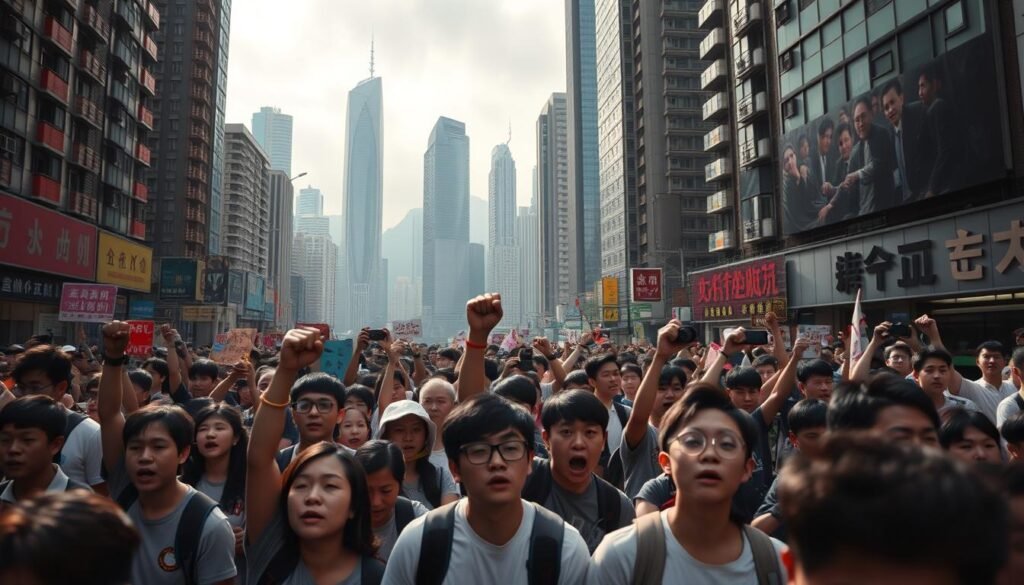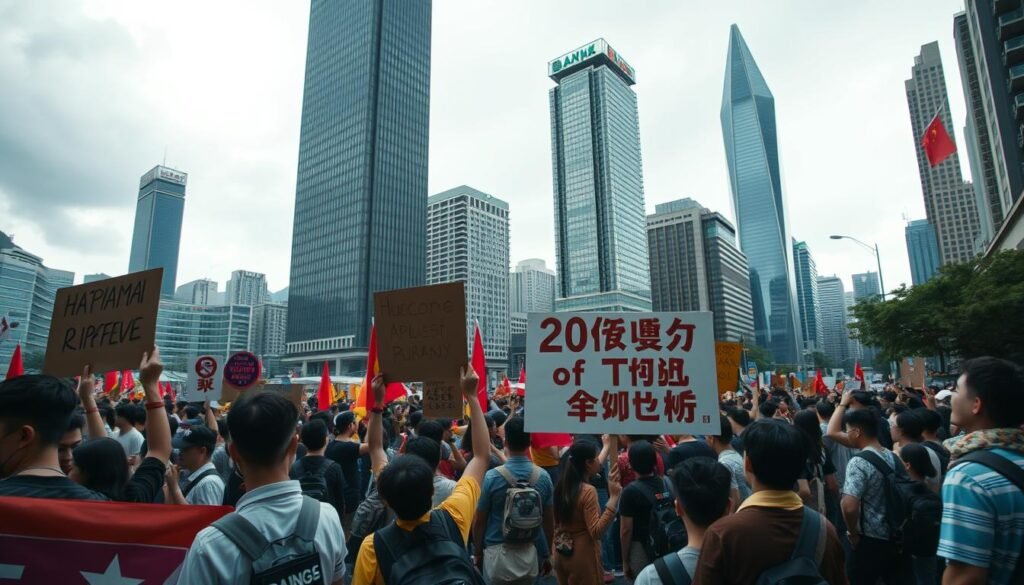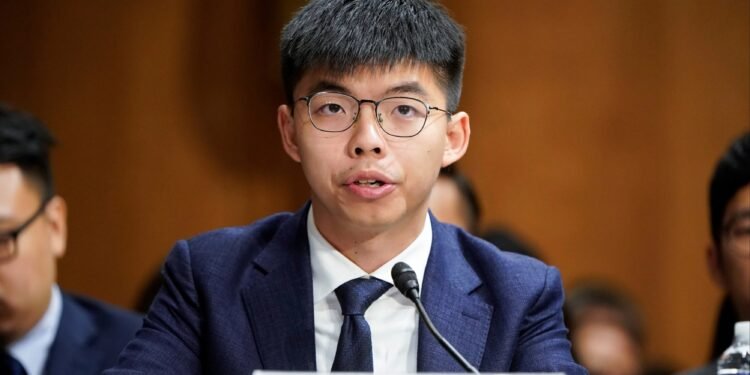What happens when a young voice for freedom faces charges that could silence it for life?
This question lies at the heart of one of the most compelling stories in recent years. At just 28 years old, this prominent activist has spent over four years in jail. He has been either awaiting trial or serving sentences.
Now, he confronts new national security charges. These charges carry the potential for life imprisonment if he is found guilty. His case has drawn international attention and raised serious human rights concerns.
The situation reflects the broader political landscape in the city. Hong Kong’s national security law has reshaped civic activism. This individual has become a symbol of the pro-democracy movement there.
His journey began with student protests. It has led to his current imprisonment. This timeline shows a persistent fight for rights against a powerful government.
The court and police actions in his case highlight tensions. They also signal implications for others who speak out. This story is not just about one person. It is about the future of protest in the city.
Key Takeaways
- Joshua Wong is a well-known pro-democracy activist from Hong Kong.
- He has been imprisoned for more than four years, either awaiting trial or serving sentences.
- He currently faces severe national security charges that could result in life imprisonment.
- His case is set against the backdrop of Hong Kong’s political changes and the national security law.
- Wong symbolizes the pro-democracy movement and has attracted global human rights attention.
- His activism timeline spans from student-led protests to his ongoing legal battles.
- The outcome of his case could impact civic activism and free speech in Hong Kong.
Who Is Joshua Wong?
His activism roots trace back to high school protests that would shape his future and Hong Kong’s democracy movement. Born and educated in the city, he quickly emerged as a vocal student leader.
At just 14, he began organizing against what he saw as government overreach. This early involvement set the stage for his lifelong commitment to civic rights.
In 2016, he co-founded the political party Demosisto with fellow activists Nathan Law and Agnes Chow. The group advocated for greater autonomy for the special administrative region.
His political ideology centered on democratic principles and self-determination. He believed strongly in preserving Hong Kong’s unique identity within China.
The implementation of the national security law in 2020 forced Demosisto to disband. This marked a turning point in his activism journey.
His transformation from local organizer to international figure happened rapidly. World leaders and human rights groups began recognizing his efforts.
His leadership style combined passionate rhetoric with strategic organizing. He mobilized young people across the city to participate in protests.
Personal characteristics like fearlessness and conviction defined his approach. These qualities made him both admired and controversial.
Through years of activism, he maintained focus on democratic values. His work continues to influence the pro-democracy movement today.
Early Activism and Rise to Prominence
A teenage organizer would soon capture global attention through strategic protests that challenged educational policies in the city. His journey into the spotlight began with student-led demonstrations that would define a generation’s political awakening.

The 2012 National Education Protests
In 2012, the young activist mobilized students against a proposed national education curriculum. Many saw this program as political indoctrination from mainland China.
At just 15 years old, he demonstrated remarkable organizing skills. He coordinated school walkouts and public demonstrations that drew thousands of participants.
The protests successfully pressured the Hong Kong government to suspend the controversial program. This victory marked a significant moment for student activism in the city.
Leadership in the 2014 Occupy Movement
The 2014 Umbrella Movement represented a major escalation in pro-democracy activism. For 79 days, protesters occupied key areas of Hong Kong demanding genuine electoral reforms.
As one of the movement’s most visible leaders, the activist helped coordinate protest activities and communicate movement goals. His articulate speeches and media appearances brought international attention to the cause.
In September 2014, he participated in a protest at Hong Kong Civic Square that led to his first arrest. Authorities charged him with unlawful assembly, beginning his long history with the court system.
These early movements established protest strategies that would influence later demonstrations. They also positioned the young leader as a central figure in Hong Kong’s democracy movement.
Legal Challenges and Sentences
The legal journey of this prominent activist shows a clear pattern of escalating judicial responses to protest actions. Each court case brought heavier penalties and more serious allegations under changing laws.
2014 Civic Square Protest and Initial Convictions
His first encounter with the justice system followed the 2014 Civic Square protest. Authorities initially sentenced him to community service.
Prosecutors appealed this decision successfully. The court increased the punishment to six months behind bars.
This case established a pattern where initial sentences faced government appeals for harsher terms. It marked the beginning of his extended time in custody.
2019-2020 Protest-Related Charges
The 2019 protest movement brought multiple new cases against the activist. He received a 13.5-month sentence for organizing unauthorized assemblies.
Additional charges followed for an October 2019 rally and June 2020 vigil. These cases added more months to his total imprisonment period.
Fellow activists like Nathan Law faced similar legal pressure during this period. Many received substantial sentences for their roles in the protests.
National Security Law Charges and Life Sentence Risks
The national security law transformed the legal landscape in 2020. It created new categories of offenses with severe penalties.
In 2021, authorities brought subversion charges against the activist. This related to participation in an unofficial primary election.
These charges carried possible life imprisonment under the security law. The case represented the most serious threat to his freedom.
Currently serving a 56-month sentence, he faces expected release in January 2027. However, new 2024 charges complicate this timeline.
Recent allegations involve conspiracy to collude with foreign forces. This represents another potential life sentence case.
The judicial process has shown limited success for appeal arguments. Court outcomes consistently favored prosecution positions.
International Reactions and Support
International responses to the activist’s legal battles have revealed deep divisions in global human rights perspectives. The case has drawn attention from governments, organizations, and media outlets worldwide.
These reactions reflect broader concerns about democratic values and civil liberties. Many see the situation as a test case for international human rights standards.
Global Condemnation and Human Rights Advocacy
Major human rights organizations have strongly criticized the legal proceedings. Human Rights Watch described the new charges as arbitrary and outrageous.
Amnesty International warned that the allegations could result in life imprisonment. Both groups expressed deep concern about the broader implications for civil rights.
The European Parliament passed resolutions condemning the human rights situation. They specifically called for the activist’s immediate release from custody.
International media coverage has been extensive and largely critical. Editorial positions across major publications have questioned the fairness of the judicial process.
Foreign politicians and legislative bodies have shown consistent support. Many have issued statements advocating for democratic principles and human rights protections.

Exile of Fellow Activists and Sanctions Calls
The national security law implementation prompted many activists to leave Hong Kong. Nathan Law fled to Britain in 2020 seeking political asylum.
British authorities granted him refugee status the following year. His exile represents a broader pattern of dissidents seeking safety abroad.
Hong Kong authorities responded by offering substantial financial rewards. They promised HK$1 million for information leading to arrests of exiled activists.
Many countries have debated imposing sanctions on Chinese and Hong Kong officials. These discussions reflect growing international concern about the situation.
Social media platforms have played a crucial role in amplifying the case. International attention has maintained pressure on authorities despite geographical distance.
The effectiveness of this external pressure remains limited in practical terms. However, it continues to shape the global narrative around human rights in the region.
Impact of Hong Kong’s National Security Law
The 2020 security legislation transformed Hong Kong’s political landscape dramatically. This sweeping law created new legal boundaries for dissent and protest.
Beijing implemented the measure following massive 2019 demonstrations. It aimed to address what officials called national security threats.
Enactment and Broad Applications
The national security law established four major crime categories. These include secession, subversion, terrorism, and foreign collusion.
Each offense carries severe penalties up to life behind bars. The legislation took effect immediately in June 2020.
Hong Kong authorities received broad powers under the new framework. Police gained expanded surveillance and arrest capabilities.
Court procedures changed to handle security cases differently. Judges from mainland China sometimes oversee these trials.
The law’s language allows wide interpretation by prosecutors. This flexibility has concerned human rights organizations worldwide.
Government supporters argue the measure ensures stability. They point to reduced street violence since implementation.
Chilling Effect on Civic Activism
The security law created immediate changes in civil society. Pro-democracy groups disbanded rather than risk prosecution.
Demosisto, co-founded by Joshua Wong, dissolved shortly after the law’s passage. Other organizations followed this pattern throughout the city.
Public discourse shifted noticeably as people grew more cautious. Many activists began self-censoring their online comments.
Libraries removed books by prominent democracy advocates. This cultural cleansing extended to academic institutions.
Protest patterns changed from mass gatherings to smaller actions. The famous umbrellas and masks disappeared from demonstrations.
Five years after the law’s implementation, the chilling effect continues. Many dissidents have left Hong Kong seeking safety abroad.
New charges under the security law emerge regularly. These cases often involve previously acceptable political activities.
The legislation’s impact extends beyond formal prosecutions. Its mere existence discourages many forms of peaceful activism.
Conclusion
Hong Kong’s political landscape has shifted dramatically since July 2020. The national security law reshaped civic activism across the city.
This prominent activist symbolizes the struggle for rights and freedoms. His journey from student leader to imprisoned dissident reflects broader government actions.
He currently faces years behind bars with possible life sentences. New charges allege collusion with foreign forces.
This case shows a pattern of escalating legal pressure on dissent. It has created a chilling effect on political participation.
International calls for sanctions highlight global concern. The outcome will impact Hong Kong’s future and its democracy movement.
FAQ
Who is Joshua Wong?
He is a Hong Kong pro-democracy activist who gained international recognition for his leadership in major student-led protests, starting as a teenager.
What is the most serious legal threat he faces?
He faces charges under Hong Kong’s National Security Law, which carries a maximum penalty of life behind bars for offenses like collusion with foreign forces.
How has the international community responded to his sentencing?
Governments and human rights organizations worldwide have condemned the actions of Hong Kong authorities, calling the charges politically motivated and advocating for sanctions.
What effect has the National Security Law had on activism?
The law has had a profound chilling effect, leading to the arrest of numerous dissidents and causing many activists to flee the city to avoid severe sentences.
Why was he initially imprisoned?
His initial jail time resulted from convictions related to unauthorized assemblies during the 2014 pro-democracy protests and later actions in 2019.





